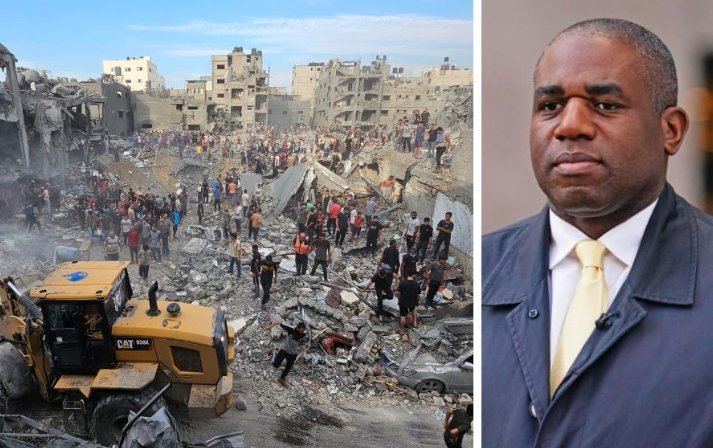Shadow foreign secretary says Israel’s attack on refugee camp can be legally justified if there is a military objective
David Lammy, the shadow foreign secretary, has sparked outrage and criticism after he said that Israel’s bombing of a refugee camp in Gaza can be legally justified if there is a military objective.
Lammy made the controversial statement on BBC Radio 4’s Today programme on Friday, when he was asked about the civilian deaths at the Jabalia camp, where at least 10 people were killed, including eight children, in an Israeli airstrike.
“It’s wrong to bomb a refugee camp but clearly if there is a military objective it can be legally justifiable,” Lammy said.
He added that he was appalled by the civilian casualties and called on Israel to explain how its actions conform to international law and proportionality.
Lammy’s remarks condemned by human rights groups and activists
Lammy’s remarks were met with strong condemnation by human rights groups and activists, who accused him of being complicit in war crimes and ignoring the plight of the Palestinians.
The Muslim Association of Britain tweeted: “There can be no justification, legal or otherwise, for the murder of civilians. You are complicit in war crimes @DavidLammy.”

The Palestine Solidarity Campaign said: “David Lammy’s comments are shocking and unacceptable. He is effectively giving a green light to Israel to continue its indiscriminate bombing of Gaza, which has killed over 200 people, including 61 children. He should retract his statement and apologise immediately.”
The Stop the War Coalition said: “David Lammy’s comments are disgraceful and show a complete disregard for the lives of Palestinians. He is echoing the propaganda of the Israeli government, which claims that its attacks are aimed at Hamas, while in reality they are targeting civilians and infrastructure. He should resign from his position as shadow foreign secretary.”
Lammy’s comments contrast with Labour’s official position on Gaza
Lammy’s comments also contrast with Labour’s official position on the Gaza crisis, which has called for an immediate ceasefire and condemned the violence on both sides.
Labour leader Keir Starmer said on Wednesday that he was “deeply concerned” by the escalating violence and urged both sides to “step back from the brink”.
He said: “The violence we have seen in Israel and the occupied Palestinian territories is shocking and appalling. The loss of life, including children, is a tragedy that we all mourn. Both sides must show restraint and work with the international community to de-escalate the situation and end the cycle of violence.”
He also said that Labour supported the right of Israel to defend itself against rocket attacks by Hamas, but stressed that any response must be “proportionate and in line with international humanitarian law”.
Lammy’s comments reflect Labour’s internal divisions over Israel-Palestine issue
Lammy’s comments also reflect the internal divisions within Labour over the Israel-Palestine issue, which has been a source of controversy and conflict for the party in recent years.
Under the previous leadership of Jeremy Corbyn, Labour adopted a more pro-Palestinian stance, which led to accusations of antisemitism and alienation of some Jewish voters and groups.
Under Starmer, Labour has sought to distance itself from Corbyn’s legacy and rebuild trust with the Jewish community, but this has also angered some pro-Palestinian members and supporters, who feel that the party is not doing enough to stand up for the rights and dignity of the Palestinians.
Lammy, who was a vocal critic of Corbyn and a supporter of Starmer, has been seen as part of the party’s shift towards a more pro-Israeli position, which has also been reflected in some of his recent appointments, such as Lisa Nandy as shadow foreign secretary and Wes Streeting as shadow secretary of state for child poverty.
Lammy’s comments may have political consequences for Labour
Lammy’s comments may also have political consequences for Labour, as they could damage the party’s reputation and support among some key constituencies and groups.
Lammy, who represents Tottenham, a diverse and multicultural constituency in north London, may face a backlash from some of his constituents, especially those from Muslim and ethnic minority backgrounds, who are more likely to sympathise with the Palestinian cause and oppose Israel’s actions.
Lammy may also lose the respect and trust of some of his colleagues and allies, who have been more outspoken and critical of Israel’s aggression and violations of human rights.
For example, Diane Abbott, the former shadow home secretary and a close friend of Lammy, tweeted on Friday: “I stand with the people of Palestine. There is no justification for bombing schools, hospitals and media offices. The world must act to stop this violence and end the occupation.”
Lammy may also face a challenge from the left-wing faction of the party, which has been vocal and active in supporting the Palestinian struggle and calling for a stronger and more principled stance from Labour.
For instance, John McDonnell, the former shadow chancellor and a prominent figure of the left, said on Friday: “The Labour Party must now urgently call for an immediate ceasefire, an end to the occupation and settlements, and support the right of the Palestinian people to self-determination.”
Lammy’s comments may also affect Labour’s electoral prospects, as they could alienate some voters and activists who are concerned about the humanitarian crisis in Gaza and the injustice and oppression faced by the Palestinians.
Lammy’s comments may also play into the hands of the Conservative government, which has been supportive of Israel and reluctant to criticise its actions, and which may use Lammy’s remarks to portray Labour as weak and divided on foreign policy and national security issues.


















